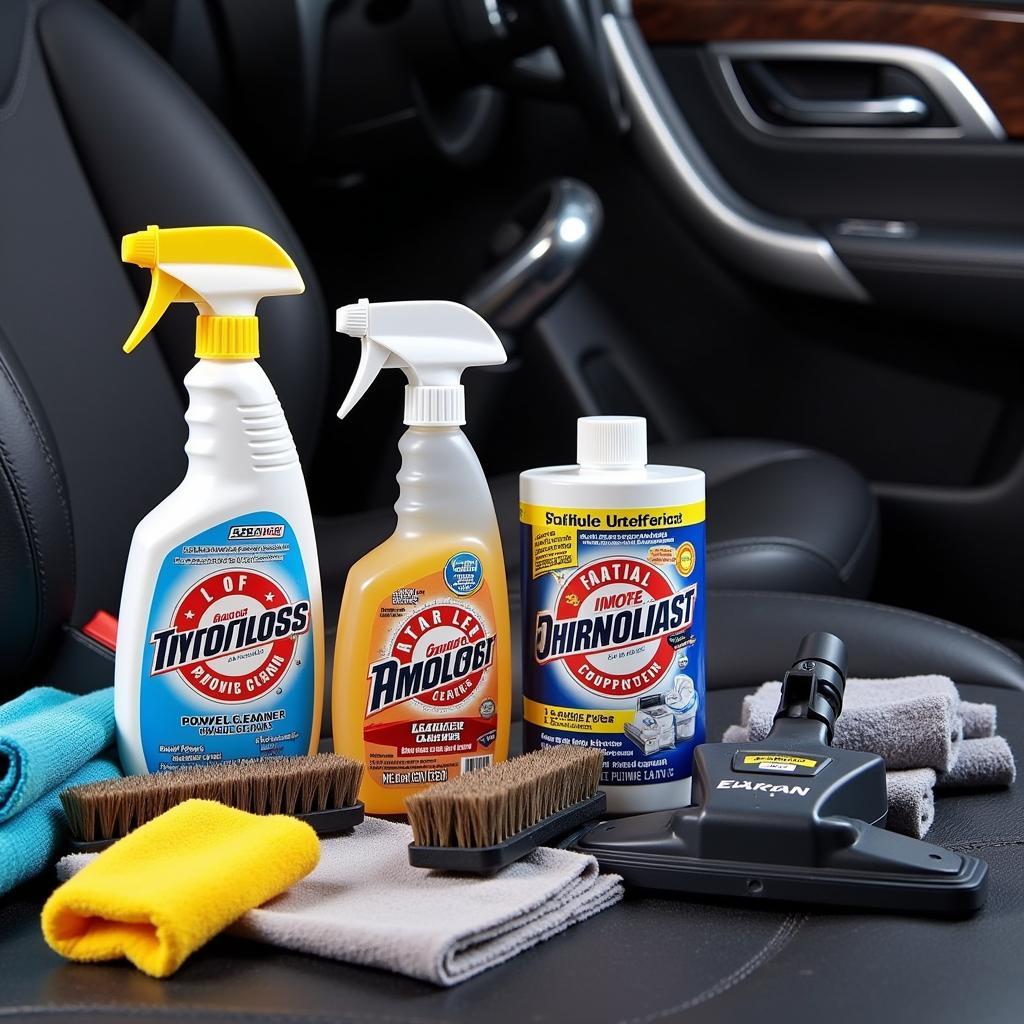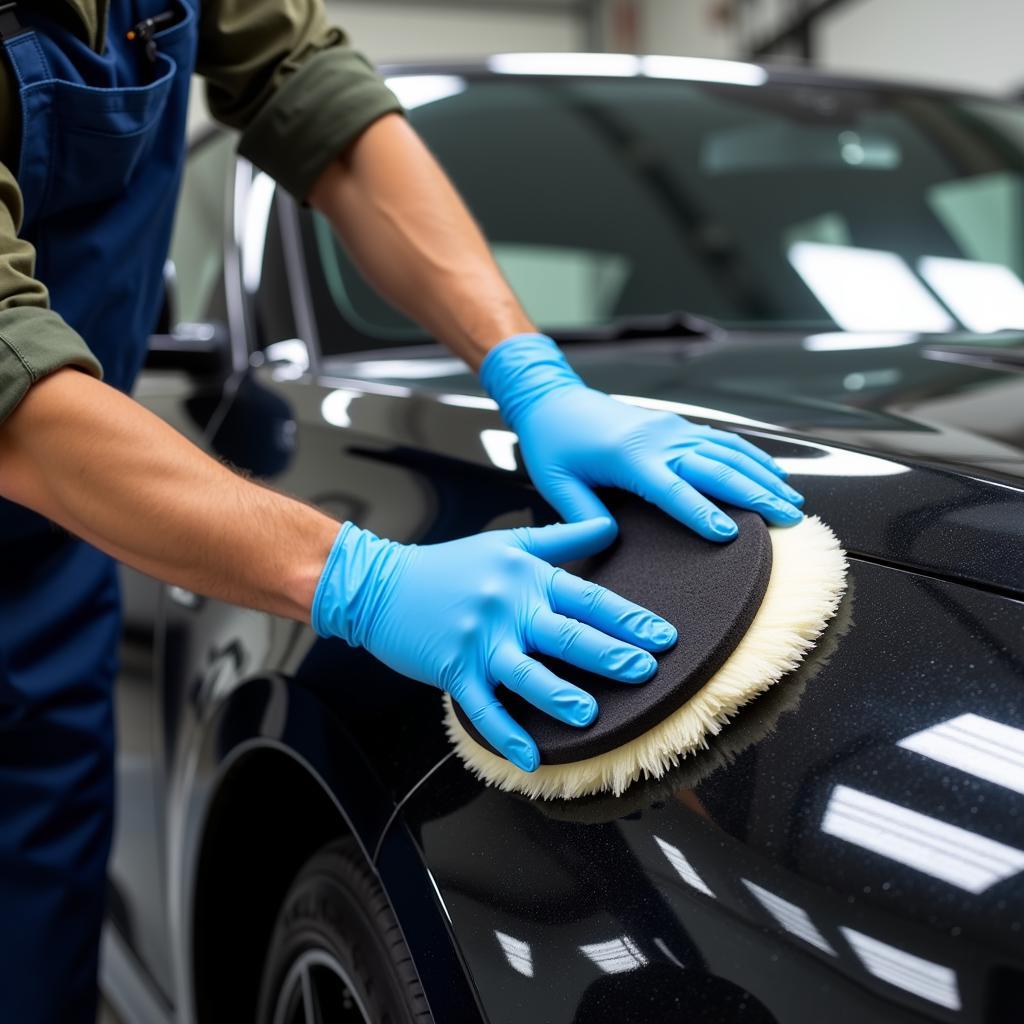Car detailing goes beyond a simple car wash and involves a meticulous process using specialized chemicals to achieve a showroom-worthy finish. Understanding what chemicals car detailing use is crucial for both professionals and car enthusiasts seeking the best results for their vehicles. This article dives deep into the world of car detailing chemicals, exploring their functions, benefits, and potential risks.
Decoding the Chemistry of Car Detailing
Professional car detailers utilize a range of chemicals, each designed for a specific purpose. From pre-wash treatments to final wax applications, the right chemicals can dramatically enhance the appearance and longevity of a vehicle’s paintwork, interior, and exterior components. Knowing the purpose of each chemical ensures effective and safe application.
Exterior Car Detailing Chemicals
Exterior detailing involves multiple stages, each requiring specialized chemical solutions:
- Pre-wash: Traffic film removers and bug and tar removers are used to loosen stubborn grime before the main wash. These are crucial for lifting contaminants that regular washing can’t handle.
- Washing: Car wash soaps specifically designed for detailing are pH-neutral and gentle on paintwork, unlike harsh household detergents. They effectively remove dirt and grime without stripping away protective waxes.
- Decontamination: Clay bars, iron removers, and tar removers are employed to eliminate embedded contaminants like iron particles and tar that stick to the paint. These are essential for achieving a smooth, glass-like finish.
- Polishing and Compounding: These processes utilize abrasives to remove minor scratches and swirl marks, restoring the paint’s clarity and shine. Different levels of abrasiveness cater to varying paint conditions.
- Protection: Sealants, waxes, and ceramic coatings provide a protective layer against environmental elements like UV rays, acid rain, and bird droppings, preserving the paint’s finish for longer periods.
Interior Car Detailing Chemicals
Interior detailing focuses on cleaning and protecting the various surfaces within the car:
- Cleaning: All-purpose cleaners, leather cleaners, and upholstery cleaners are used to remove dirt, stains, and odors from different interior surfaces. Specialized cleaners are available for specific materials like leather, vinyl, and fabric.
- Protecting: Leather conditioners and fabric protectants help to maintain the appearance and suppleness of interior materials, preventing cracking, fading, and staining. These also offer UV protection.
- Odor Removal: Odor eliminators neutralize unpleasant smells within the car, leaving a fresh and clean scent. Ozone generators are sometimes used for deep odor removal.
 Interior Car Detailing Chemicals and Tools
Interior Car Detailing Chemicals and Tools
Choosing the Right Chemicals: Safety and Effectiveness
While effective, detailing chemicals can be hazardous if misused. Always follow the manufacturer’s instructions carefully and wear appropriate protective gear. Consider the specific needs of your vehicle and choose products accordingly. For instance, a car exposed to harsh weather conditions might benefit from a ceramic coating for added protection. Similarly, choosing the right interior cleaner depends on the material of the upholstery. Understanding who does car detailing near me can also provide valuable insights into the best chemicals for your specific car and environment.
Understanding Chemical Composition
Knowing the basic chemical composition of detailing products helps you make informed decisions:
- pH Levels: pH-neutral products are generally safe for most surfaces. Acidic products can be effective for removing stubborn stains but should be used with caution. Alkaline products are effective degreasers but can strip waxes and damage delicate surfaces.
- Abrasives: Polishes and compounds contain abrasives that remove a thin layer of clear coat. Using excessively abrasive products can damage the paintwork.
- Solvents: Some cleaning products contain solvents that can dissolve grease and grime but can also damage certain plastics and rubbers.
Why Professional Detailers Matter
Detailing requires expertise and experience to achieve optimal results. Professional detailers have the knowledge and training to use these chemicals safely and effectively, minimizing the risk of damage. Their expertise ensures the right combination of chemicals and techniques is used for each specific surface and condition. Just like knowing the answer to do you need a business license to detail cars is crucial for operating legally, understanding car detailing chemicals is essential for achieving a perfect finish.
 Professional Car Detailer Applying Ceramic Coating
Professional Car Detailer Applying Ceramic Coating
Conclusion
Car detailing involves a complex interplay of specialized chemicals, each designed for a specific purpose. Understanding what chemicals car detailing use empowers you to make informed choices about the products and services you choose for your vehicle. Whether you’re a DIY enthusiast or prefer professional detailing, knowing the basics ensures a safe and effective detailing process, resulting in a pristine and protected vehicle. The right chemicals, combined with proper technique, can dramatically enhance the appearance and longevity of your car. Learning more about what car wash soap do detail shops use can also give you an idea of the professional standards for car washing. Remember to always prioritize safety and follow manufacturer’s instructions. If you have any concerns or specific needs, consulting a professional detailer is always recommended. For further information on interior detailing, especially window cleaning, you can explore resources like what do car detailers use to clean interior windows. Similarly, for those interested in the industry, do car detailers get drug tested might be a relevant question to research.
Need help? Contact us via WhatsApp: +1(641)206-8880 or Email: [email protected]. Our 24/7 customer support team is ready to assist you.

Leave a Reply